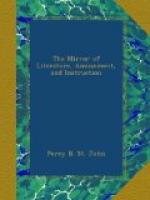“After reference to our geographical charts, we took our seats in our stanhopes, being preceded by our travelling chariots, a detachment of the Lancers, by way of security, two interpreters, a guide, and a surgeon, in case of casualties. By the instructions of the guide we steered in a direction N.E.E., and as we proceeded farther into the country, the barbarity and uncivilization became more apparent. Crossing a swamp called the Strand, we arrived at a native settlement called Drury Lane, inhabited by a horde infinitely more barbarous and rude than the tribe by which we were accosted on landing. The indigites of this soil, in ferocity of appearance, exceeded all our previous idea of savage life. They are generally tattooed, but the crevices in their skin, instead of variegated colours as the savages of the South Seas, seemed to be filled up by a composition much resembling dirt. They had, however, no tomahawks, nor implements of a warlike description, nor were any of them dressed in skins; although some of them had the hide of a beast hanging from their waist downwards, which appeared their only covering, and we understand is called by them—leathern apron.
“Passing by a native wigwam, which we found in our maps defined as Vinegar Yard, we were surrounded by a motley and terrific group of the inhabitants, both male and female. Of their sex we were in great doubt, especially of those who carried on their heads a kind of wicker basket, in which were a quantity of fish, of whose genus our naturalist declared himself perfectly ignorant. As we had often heard of the simplicity of man when undefiled by a knowledge of the world, of his hospitality, and his overflowing milk of human kindness, and feeling besides exhausted from the length and difficulties of our journey, we determined upon putting these fabled attributes to the proof. Holding up his stick, as an emblem of peaceable intentions, and backed by the Lancers, our interpreter advanced, and inquired for the hut of their chief, and requested, as we were much exhausted, they would oblige us with a small quantity of their ava, and a few of their native yams. As they seemed unable to detect his meaning, which we endeavoured to make more palpable, by all of us at the same time advancing, simultaneously putting our fingers down our mouths, and rubbing our stomachs, in order to have our urgent necessities immediately gratified.
“Instead of our wants having been anticipated, as we had naturally supposed, the whole tribe immediately set up a discordant yell. Believing that we were still misunderstood, we resolved on asking for food, and assuring them of our peaceable intentions in all the languages we were masters of. One of the Lancers who had, during foreign service, picked up a few expressions of the Cherokee Indians, and also a knowledge of their habits, proposed addressing them. A consultation being held, and the result being favourable, he advanced; and, in the Cherokian language, asked for food, invoked at the same time the great spirit, which he did by spitting on his hands (an Indian custom), and holding up his right foot for the purpose of his auditor kissing it, as a token of conciliation. The person whom he addressed, in an uncouth, but certainly melodious language, answered in these words:




